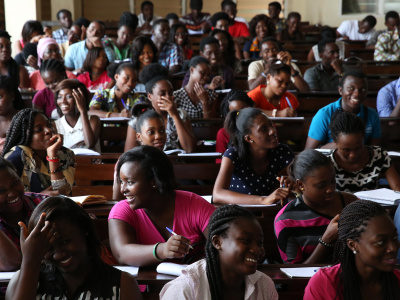
Youth activism on peace and security: Continental agendas and AU-EU cooperation
Many young people in Africa are agents of peace. They engage in building peace by transforming the structures and institutions that hinder socio-economic and political well-being, especially in fragile and conflict-affected communities. The UN Youth, Peace and Security (YPS) Agenda has been a milestone for improved peace and security on the African continent, and it has also contributed to strengthening cooperation on peace and security between Africa and Europe.
Why a UN Agenda on Youth, Peace and Security
The whole world is confronted by the challenge of building long-lasting peace. To achieve this, peacebuilding processes must be transformative and provide space for a diverse set of actors, including young people, who are a big part and the strength of those who hold the guns. As violence continues to increase around the globe, young people’s contributions to peace processes have attracted growing attention from peace-makers, institutions and agencies. This includes the United Nations (UN), as reflected in the Security Council’s Resolution 2250/2015 on Youth, Peace and Security (YPS).
Does the YPS Agenda really boost Africa-Europe cooperation?
The YPS Agenda has been seen as a big added value for broadening and strengthening the cooperation between the African Union (AU) and European Union (EU), also through young people's engagement. On several occasions, for instance, during visits of the African Youth Advocacy Team (A-YAT) in October 2018 and December 2019, the EU Delegation to the AU in Addis Ababa reiterated its support for the YPS Agenda and other youth-led programmes, such as the AU-EU Cooperation Hub, and pointed out it had devoted specific funds for them. In Africa, the YPS Agenda is becoming a pillar for peace and the AU has established roles and structures bringing targeted support for its implementation. These include:
(1) appointment of the AU Youth Envoy;
(2) appointment of the African Youth Peace Ambassadors based in each of the five regions of the continent, and
(3) establishment of two African Youth Charter Hustlers at the national level in all countries across the continent.
In addition to these initiatives, the AU has conducted a ‘Study on the Roles and Contributions of Youth to Peace and Security in Africa’ (published in June 2020), which led to a continental framework on YPS. This framework aims to ‘facilitate the meaningful engagement and participation of African youth in all spectrums of peace and security at national, regional and continental levels’ and pursues three specific objectives:
(1) full recognition of efforts of young Africans in peace and security;
(2) enhanced partnerships and collaboration among all relevant stakeholders, such as youth, member states, regional economic communities (RECs), regional mechanisms (RMs), African Union Commission (AUC), civil society organisations, academia, media and private sector;
(3) development of youth-led and youth-centred strategic plans, initiatives and programmes by the African Union Commission (AUC), regional economic communities (RECs), regional mechanisms (RMs), member states, and other stakeholders. It is a great thing for African young people to see such programmes established on both sides (Africa and Europe).
This brings its own set of challenges
Nevertheless, digging in deep, a number of challenges prevent this cooperation from fully untap its potential. Some of them are of a purely administrative nature and relate to difficulties often encountered by young Africans to obtain the necessary VISA to participate in AU-EU-funded projects/ initiatives that take place in Europe. This has drawbacks on the chances to achieve meaningful outcomes based on views and contributions from European and African youth.
Other challenges relate to the possibility of youth-led African organisations securing adequate funding to support their initiatives in the long term. Indeed, many youth organisations are primarily driven by volunteers, and most operate on US $5,000 per year or less (findings from a 2017 study by UNOY and the international NGO Search for Common Ground). This means that youth engagement remains voluntary in most cases. When it comes to EU funds, small African organisations cannot access them unless they team up with larger EU-based counterparts. Regrettably, EU funds do not reach young people directly.
Zooming in on the AU, it is confronted with several challenges. The first one concerns the implementation of its own plans. For example, the AU vowed to “Silence the Guns” on the continent by 2020, yet in early 2021 young people still hold guns in Cameroon, Nigeria, the Central African Republic and elsewhere. The second challenge relates to the real possibility to act of continental and regional institutions. Established structures, including the RECs, seem to be inactive due to a lack of funds to implement plans, as well as the COVID-19 outbreak. The third challenge concerns the digital divide as a main cause of exclusion, as 70% of African young people are offline. This problem becomes even more pressing in the context of the global pandemic.
Seeing the available structures, young people have huge potential to benefit from a revitalised AU-EU cooperation. They are experienced, and uniquely able to mobilise both other young people and community members. They have access to spaces where other organisations may not be welcome. With greater access to resources (e.g. funds, internet connection), they can have a greater impact, including preventing violence in their communities – for example, by discouraging their peers to join violent groups.
Meaningful and long-lasting change can only be achieved if the opportunities disclosed by the AU-EU cooperation were fair to all, with youth representatives trusted by all stakeholders and adequate funding to support their work.
About the author
Raphael Nkurunziza is a Burundian young peacebuilder. He is part of the Youth Empowerment and Leadership Initiative, regional coordinator for East and Southern Africa at the United Network of Young Peacebuilders (UNOY) in East and Southern Africa, and chairs the African Youth Advocacy Team (A-YAT).
Twitter: @NkurunzizaRapha | Website
Read the full magazine issue
This video interview appears in the youth edition of ECDPM's Great Insights magazine – check out the full issue or the other articles and multimedia below.








